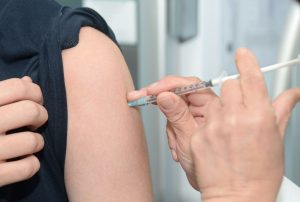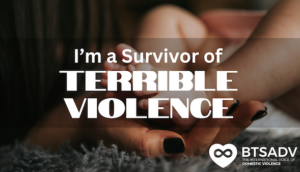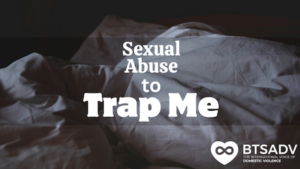By Amy Thomson
As survivors, it’s not uncommon to find shared experiences in others’ stories of surviving intimate partner violence. While the underlying methods of abuse are similar, there are ways that abusers exploit our circumstances to manipulate, control, and punish us.
One form of abuse that can be experienced regardless of gender or sexual orientation is controlling and withholding hormone treatments. While you may have limited knowledge of how hormones are incorporated into medical treatments, the actual usage of hormones covers an array of purposes. To understand how interrupting or withholding hormone therapies can be used as a tool of abuse, it’s important to know how they are used.
How Hormones Are Used
Menopausal Hormone Therapy – As women age, their bodies slowly and ultimately cease production of estrogen and progesterone. Decreasing hormones can cause sleep disturbances, irritability, hot flashes and night sweats, anxiety, and decreased sex drive. Depending upon whether or not the woman has had a hysterectomy, doctors will prescribe estrogen and progestin in the form of pills, patches, creams, or suppositories as appropriate. For those who are concerned about low sex drive, doctors may also prescribe a small amount of testosterone.
Testosterone Therapy – As men age, levels of testosterone decrease slowly over time. This occurs as a natural result of aging but can be exaggerated in those with hypogonadism, a disease where the body is unable to produce sufficient levels of the hormone due to a gland malfunction or underlying conditions such as diabetes, thyroid issues, sleep apnea, and depression. Doctors will prescribe testosterone injections, patches, or gel to reduce sleep disturbance, level mood and improve memory, increase energy, and make it easier to regulate sex drive, body fat, muscle bulk, and other physical conditions.
Diabetes – There are several hormones our bodies produce to regulate blood sugar levels, including glucagon, amylin, cortisol, growth hormones, epinephrine, GIP, and GIP-1. All of these hormones work together to maintain stable blood sugars, but a key piece of the puzzle is insulin. (To learn more about how they work together, visit Diabetes Education Online.) When the pancreas is unable to produce normal levels of insulin, it causes hypoglycemia (low glucose), and Type I and II Diabetes. Types I and II diabetes are treated with a range of medications in pill form and insulin injections and pumps for more severe cases.
Cancer – Because some cancers are believed to be driven by hormone levels, hormone therapies have been developed to fight the illnesses. Currently, hormone therapies are used in treating breast and prostate cancers. There are three ways hormones can be used to stop cancer from spreading: blocking their ability to act, stop the body from producing it, and change or eliminate hormone receptors. Doctors will use these treatments as another option to surgery and radiation and prescribe them in the form of oral, injection, or surgical procedures.
Medical Transitioning – Not everyone internally identifies with their biological sex, and there are many ways a person can feel more comfortable in their skin. To help this process, transgender individuals may choose medical options, including hormone treatments and surgical procedure. The hormone treatments prescribed will depend upon whether they want to create feminine or masculine features.
For transwomen, therapies will include estrogen and spironolactone, anti-androgens, GnRH agonists, or progesterone. These will decrease the growth of body hair, reduce muscle mass, soften skin, and aid in the development of hips and breasts. Because there are limited effects of these hormones, other treatments including voice training, hair removal, and facial feminization procedures may be used if the person chooses.
Transmen will receive testosterone (and sometimes finasteride) therapy. Usage of these therapies causes several changes to occur, including thickening of facial bone structure, deepening voice, fat redistribution, increased muscle mass, and increase in hair growth. Because testosterone does not affect ovulation, contraception or other procedures may be used to prevent the occurrence of pregnancy.
Ways Abusers Use Hormones to Control and Punish Their Victims
Like pets, children, and other things that can be used to cause emotional duress or coercively modify behavior, abusers will use a victim’s access to medical procedures and treatments against them.
As a form of punishment, the abuser might stop their victim from taking needed medication or hormones. At other times, they may threaten to withhold or temporarily interrupt their victim’s treatments to coerce the victim into modifying their behavior or agreeing to things they usually would not do.
Here are some ways the abuser might do this:
- Preventing their victim from having access to medical insurance,
- Denying them access to money, credit, or bank cards to pay for their treatments,
- Preventing them from attending medical appointments or canceling medical procedures,
- Throwing away their treatments and syringes (for injectables),
- Forcibly administering excess doses of hormones or injecting them with insulin,
- Allowing a person with diabetes to crash, including waiting for them to go into convulsions, before administering insulin and calling for medical attention,
- Threatening to out their trans status to family, friends, or co-workers.
How Withholding Hormone Treatments Can Affect the Victim
While it may not sound dangerous, interrupting or withholding hormone treatments can have serious health consequences. More than merely causing a return of symptoms the victim might find troubling, having treatments forcibly interrupted or stopped can increase the risk of the other conditions and death. In some cases, the emotional duress can contribute to increased risk of suicide.
Men and women who use hormone therapies as a normal part of aging may again deal with sleep disturbances, moodiness and depression, weight gain, and for women, hot flashes. These symptoms, while not life-threatening, can increase the amount of stress the victim is already experiencing during abuse and contribute to the onset of serious medical conditions. Stopping or interrupting therapies can also increase a person’s risk for high blood pressure and some forms of cancer.
For victims who have hypoglycemia or Type I or II diabetes, an abuser hindering or stopping them from regulating their conditions can have deadly consequences. In cases of hypoglycemia – low blood sugar caused by excess insulin production – an abuser may control when the victim is allowed to eat, opting to deny food when they know it would cause the victim’s sugar levels to crash. Warning signs such as sweating, tremor, palpitations, and confusion when ignored for extended periods can potentially lead to convulsions and coma.
Interfering with type I diabetes treatments can lead to dehydration, exhaustion, chronic weight loss, and, in more severe cases, coma and death. Improper treatment of type II diabetes can cause coma and death in severe cases but also contributes to the onset of diabetes mellitus, a condition that can lead to diabetic retinopathy, neuropathy, amputations, and dialysis resulting from damage caused to the feet, eyes, kidneys in severe cases. It also increases the risk of heart attack, stroke, and poor circulation.
What You Can Do
If you are in immediate danger or need emergency medical help, call 911 before doing anything else in the event medical intervention is required.
Create a safety plan that includes an arrangement to hide extra treatments in a place where your abuser does not have access. Aside from including contact information for your doctors in the safety plan, it would help if you had a conversation with any medical professional administering treatment to let them know your situation.
For non-emergency issues, find a safe place away from your abuser (work, a neighbor, family, or friend’s house, etc.) and reach out to a domestic violence organization like the National Domestic Violence Hotline 800-799-7233, Forge (for transmen and women) at 414-559-2123, or BTSADV at 855-277-1777 for help.
Always remember that the abuse you are experiencing is not your fault. Someone who loves you would never endanger you or risk your life. You deserve to feel safe, protected and loved.
If you or someone you know is in an abusive relationship, there is help. You can visit the Break the Silence website at www.breakthesilencedv.org or chat with one of our helpline advocates at 855-287-1777.










